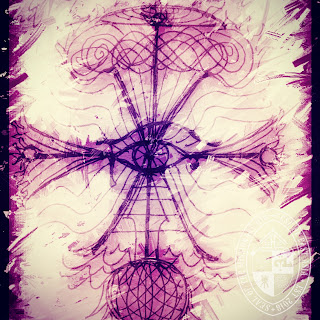ON THE PSYCHOLOGY OF CHRISTIAN REACTION
 |
| The World Reflected and Abstracted within the Human Eye, an Icon of the Nous, by Bp. Joseph Boyd |
“Be Still and Know that I am God.” - Psalm 46:10
“Wherefore, my beloved brethren, let every man be swift to hear, slow to speak, slow to wrath: for the wrath of man worketh not the righteousness of God.” - James 1:19-21
It is a really hard thing to balance a good attitude with right doctrine, so that our lives and our thoughts reflect the love and self-sacrifice of Christ, without compromising the unchanging Truth of God’s revelation in the Church. We can’t give in to fear, anger or resentment, and we have to undermine our own desire to control or to manipulate. This makes it impossible to have the typical “righteous indignation” that we see so often in ourselves and our religious brethren, when we aren’t understanding that the goodness of God leads man to repentance, and that our desire to use Truth as a hammer against others turns it into a lie. It is really hard for us ex-Protestants, because this reflexive action is learned from childhood as a defense mechanism in judgmental and superficial church relationships.
The Orthodox also do something slightly different reflexively, but equally wrong. We project our personal identity into the group, and while claiming humility and ignorance personally, then use this perceived status and power of the group as a hammer against those with whom we personally disagree. Where Protestants like to frame the contrast with God or the Bible, Orthodox like to frame the conflict with the group, which both abstractly represents their own identities and also God.
 |
| The Ruler of Thomas Hobbes’ “Leviathan” is Made Up of Many People Who Have Placed Their Personal Identities into the Single Imagined Community |
Both of these ways of dealing with people, either through reaction or abstraction, are wrong and both ultimately equate personal opinions and desires with ultimate Truth. This convolution brings division, strife and confusion into the Church, destroys evangelism and our testimony with the world for sincerity, and ultimately makes religion into a crutch for our brokenness - rather than what it is supposed to be - a transformative balm that unveils, disinfects, and cures our deep internal wounds through a cycle of constant faith, repentance, worship and prayer! Anything that teaches me that I am okay and that I have standing to persecute, belittle or try to destroy my brother or sister is always wrong and of the Devil.
I see these principles constantly in my heart, as I wrestle with the desire to react to people and correct them, showing that I “know” or am “better” in some way. Not reacting or resenting others is the hardest thing I’ve had to learn, next to controlling lustful thoughts, and it is hard because it is so easily justified by pharisaical self-righteousness. Having an evil, lustful thought is something you can easily disassociate yourself from and reject, but having a judgmental or reactionary thought it harder, because it complements your pride and desire to be seen as pious all at the same time.
As with all problems, our calling as Christians revolves around repentance and reconciliation with God and our fellow man. Constant repentance and remembering of Christ’s mercy allows us to live in the Holy Spirit and the flow of God’s grace that wipes away all fear, anger, bitterness and reaction, and makes it possible to love others with compassion and patience. When I struggle with the urge to react negatively or to have a bad attitude, I find that the ancient Fathers’ teachings on stillness and praying the Name of Jesus works wonders in recontextualizing my thoughts. Continually bringing to mind the beautiful words of the Jesus Prayers, “Lord Jesus Christ, Son of God, have mercy upon me a sinner,” stills my desire to judge others and salves my deep, internal brokenness, from which constantly bubbles up all the negative emotions and thoughts that make life difficult and leads to stress. Practicing this focus on Christ, and a commitment to watchfulness and stillness, helps me to begin the process of healing that is so necessary for sanctification and holiness as a sinful and alienated individual.
Stop reacting, be still, breath, chant the Name of Christ, focus on Him, and ask Him for mercy and help. He will help you. He will save you. He will transform you, and in transforming you, He will bring peace, joy, love and hope to those around you!
Lord Jesus Christ, Son of God, have mercy upon me a sinner!



Comments
Post a Comment